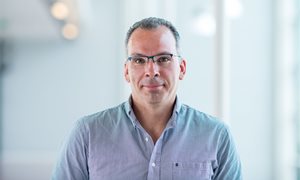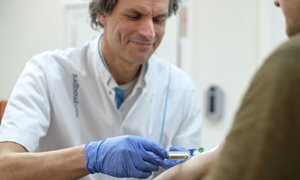
A one-time measurement of the entire tumor DNA is almost always sufficient to find all DNA errors that are important for treatment. It is precisely the DNA errors that are relevant for choosing a drug that remain remarkably stable over time, despite treatment with drugs. This was discovered by Dutch researchers led by the Antoni van Leeuwenhoek. The research, to which Henk Verheul of the Radboudumc also contributed, was published in Nature Medicine.
Cancer is caused by DNA errors that accumulate in our cells throughout life. In recent years, more and more drugs have been developed that specifically target the consequences of these DNA abnormalities in the cell. However, many of these treatment targets are very rare and therefore never found because it is not always obvious to look for them specifically. A solution to this problem is to measure the entire tumor DNA, so that all errors become visible at once. This is called Whole Genome Sequencing (WGS), a diagnostic technique that is already used in standard care for metastatic cancer for a number of indications. However, there is uncertainty about how long such a WGS test is 'valid' and thus how often this procedure should be repeated. It is known that tumors continue to change their DNA to adapt to given treatments.
Researchers, led by the Antoni van Leeuwenhoek, have now discovered that precisely those abnormalities that are important for choosing a treatment are very stable, although the rest of the tumor DNA does change rapidly. They saw this by mapping the complete DNA of tumors of 231 patients at different times during treatment. Joris van de Haar, physician-researcher at the Antoni van Leeuwenhoek: 'DNA defects for which registered drugs are available remained unchanged during treatment in 99% of patients. For DNA abnormalities for which experimental study treatments are available, this was the case in 91%.' Thus, for a physician, it will be sufficient in almost all cases to have the entire tumor DNA measured only once to get a view of all treatment options. It also makes sense to map out the tumor DNA as early as possible, for example when diagnosing metastatic cancer, so that all possible options can be discussed with a patient right away. In this way, no opportunities are missed.
Research leader Emile Voest, internist-oncologist at the Antoni van Leeuwenhoek: "Also in view of the costs of a WGS test, it is important to know that one test will almost always be sufficient. A WGS test is currently only reimbursed from basic health insurance for special indications, particularly for patients with metastatic cancer in whom the primary tumor cannot be found. On the basis of this new research, the researchers advocate making this test available to all patients with metastatic cancer.
Publication in Nature Medicine: Limited evolution of the actionable metastatic cancer genome under therapeutic pressure - Joris van de Haar, Louisa R. Hoes, Paul Roepman, Martijn P. Lolkema, Henk M. W. Verheul, Hans Gelderblom, Adrianus J. de Langen, Egbert F. Smit, Edwin Cuppen, Lodewyk F. A. Wessels & Emile E. Voest.
-
Want to know more about these subjects? Click on the buttons below for more news.
Related news items

Meniscus prosthesis Atro Medical receives 2.5 million EU grant
10 June 2022 The European Commission is providing a 2.5 million euro grant to ATRO Medical, spin-off of The Radboudumc and DSM, for the accelerated development of their artificial meniscus. go to page
More accurate surgery with the Anatomy Projector
30 May 2022The Anatomy Projector, developed at the Radboudumc, allows surgeons to operate much more accurately with projected augmented reality.
go to page
Tailored drug dosage for pregnant women
14 March 2022 Three quarters of women in the Netherlands use some form of medication during pregnancy, but little is known about the appropriate dosages. Research by the Radboudumc, MUMC+ and Lareb Mothers of Tomorrow should change this. go to page
Ioannis Sechopoulos receives NWO Vici grant for research on improving breast cancer diagnostics
1 March 2022 Ioannis Sechopoulos will conduct research into improving tomosynthesis, an X-ray examination that radiologists use to detect breast cancer. go to page
NIH grant for follow-up research on tuberculous meningitis
10 February 2022Met subsidie van het Amerikaanse NIH gaat With a grant from the U.S. NIH, Reinout van Crevel will continue to unravel the disease process of tuberculous meningitis.
go to page
